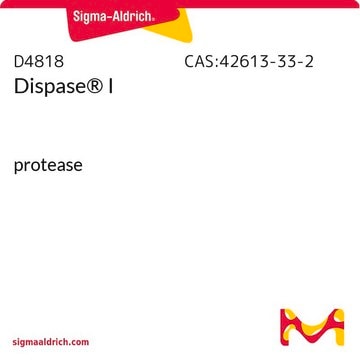D4693
Dispase® II
protease
Synonym(s):
Protease from Bacillus polymyxa
About This Item
Recommended Products
Quality Level
form
lyophilized solid
specific activity
≥0.5 units/mg solid
technique(s)
cell culture | mammalian: suitable
single cell analysis: suitable
solubility
10 mM NaAc (pH 7.5) and 5 mM CaAc: soluble
storage temp.
2-8°C
Looking for similar products? Visit Product Comparison Guide
Application
Dispase® II has been used for Fluorescence-Activated Cell Sorting (FACS). It has also been used for separating visceral yolk sac layers.
Suitable for use in preparation of single cell suspension for sequencing.
Biochem/physiol Actions
Unit Definition
Physical form
Preparation Note
Analysis Note
Legal Information
Signal Word
Danger
Hazard Statements
Precautionary Statements
Hazard Classifications
Eye Irrit. 2 - Resp. Sens. 1 - Skin Irrit. 2 - STOT SE 3
Target Organs
Respiratory system
Storage Class Code
11 - Combustible Solids
WGK
WGK 3
Flash Point(F)
Not applicable
Flash Point(C)
Not applicable
Regulatory Listings
Regulatory Listings are mainly provided for chemical products. Only limited information can be provided here for non-chemical products. No entry means none of the components are listed. It is the user’s obligation to ensure the safe and legal use of the product.
JAN Code
D4693-100G:
D4693-100G-PW:
D4693-1G-BULK:
D4693-VAR:
D4693-BULK:
D4693-1G:
Certificates of Analysis (COA)
Search for Certificates of Analysis (COA) by entering the products Lot/Batch Number. Lot and Batch Numbers can be found on a product’s label following the words ‘Lot’ or ‘Batch’.
Already Own This Product?
Find documentation for the products that you have recently purchased in the Document Library.
Customers Also Viewed
Articles
Use of MULTI-seq lipid-modified oligos, protocol, and troubleshooting guide for PCR Assays and Sequencing applications.
Organoid culture products to generate tissue and stem cell derived 3D brain, intestinal, gut, lung and cancer tumor organoid models.
Related Content
Collagenase Guide.Collagenases, enzymes that break down the native collagen that holds animal tissues together, are made by a variety of microorganisms and by many different animal cells.
Our team of scientists has experience in all areas of research including Life Science, Material Science, Chemical Synthesis, Chromatography, Analytical and many others.
Contact Technical Service










